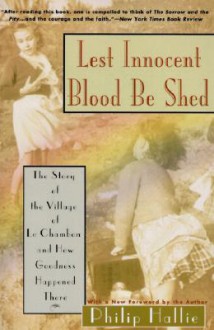Lest Innocent Blood Be Shed
During the most terrible years of World War II, when inhumanity and political insanity held most of the world in their grip and the Nazi domination of Europe seemed irrevocable and unchallenged, a miraculous event took place in a small Protestant town in southern France called Le Chambon. There,...
show more
During the most terrible years of World War II, when inhumanity and political insanity held most of the world in their grip and the Nazi domination of Europe seemed irrevocable and unchallenged, a miraculous event took place in a small Protestant town in southern France called Le Chambon. There, quietly, peacefully, and in full view of the Vichy government and a nearby division of the Nazi SS, Le Chambon's villagers and their clergy organized to save thousands of Jewish children and adults from certain death.Author Biography: Philip Hallie was Griffin Professor of Philosophy at Wesleyan University, where he taught for thirty-two years. He died in 1994, leaving this manuscript. That it can now be published is do to the devotion of his wife, Doris Ann Hallie, who contributed an afterword. The foreword by John Compton, fellow philosopher and longtime friend of the author, will help the reader to understand this unusual document in the context of Hallie's life and thought.
show less
Format: paperback
ISBN:
9780060925178 (0060925175)
ASIN: 60925175
Publish date: April 8th 1994
Publisher: Harper Perennial
Pages no: 303
Edition language: English
Category:
Non Fiction,
History,
Cultural,
Book Club,
War,
Religion,
Philosophy,
France,
World War II,
European History,
Holocaust

I was expecting this to be a straight non-fiction about the village of Le Chambon during WWII. It’s actually written as a philosophy book, concerned with ethics. I also thought (because it was billed as a new purchase) that it was recently written. Once I got over my disorientation, I found Hallie’s...

A lovely, memorable story of French village that displayed an unprecedented ethic of hospitality to refugees (especially to Jewish people) during the Occupation years of WWII. The book is written by an ethics professor who was intrigued by what happened in this small mountain community (the author h...

About violent non-viloence. One has to read the book to understand this phrase. Given the way this world is today, and hey it hasn't been that peaceful in past times either, I recommend this book to everyone. Is there an alternative to the current mess, something that will really work? Maybe so if w...

